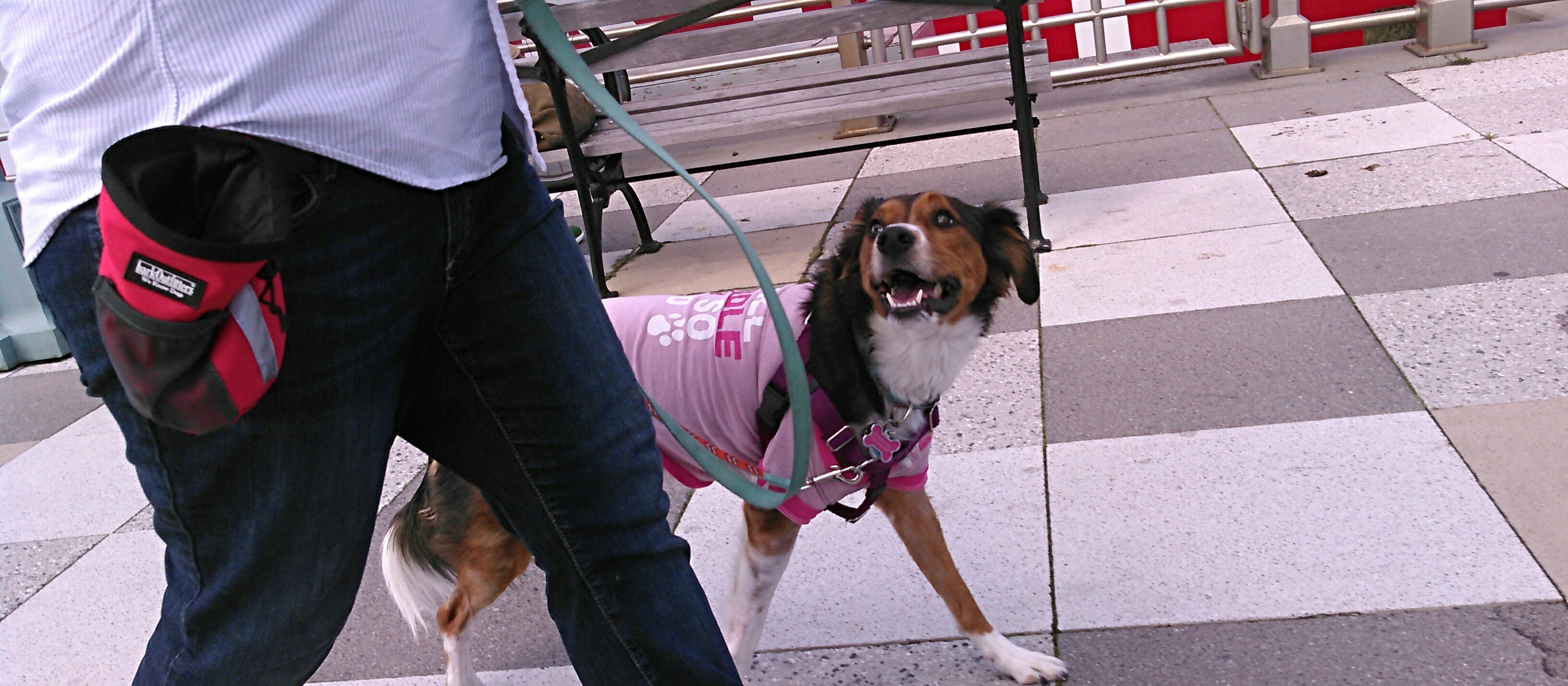
25 May Time Is of the Essence: Effective Rewards
The other day, I was working with a young dog who loves her walk times. She can’t get enough! The outdoors means she is going to play, get attention, find a great stick to chew, and make new friends. That sounds like paradise!
She has so much fun, though, that she doesn’t want to go back inside.
Because of this, I started making going inside fun, too. When she came back in, she got a reward! Most commonly a treat was dispensed as soon as she crossed the threshold. Sometimes it was a little extra play time with me. Or, we would take the elevator up one floor instead of using the back steps, which for some reason she loves and prefers. But whatever it was, she got a timely, fun reward that made coming inside just as cool as staying out.
This particular day, she performed without me asking her to. As we walked in, she immediately leapt up the steps, happy as a clam, and waited for me to reward her.
“Awesome!” I thought, and reached in my pocket for my ready-to-go cookie stash. But what I found is best described as a 6-shooter in a saloon: “You’re empty, mister.”
She waited a second, and as I moved to compensate for my lack of goodies with love and praise, I noticed her attention had quickly shifted back to all the fun stuff happening outside.
In short, I was too late.
[mk_padding_divider size=”150″][mk_image src=”https://www.puptopianyc.com/wp-content/uploads/2016/05/IMG_5164-e1464100998955.jpg” image_width=”800″ image_height=”350″ crop=”false” lightbox=”false” frame_style=”simple” target=”_self” caption_location=”inside-image” align=”left” margin_bottom=”10″]
Focus, Focus, Focus
A dog’s attention span when training and exercising is averaged out to only a few minutes. After all, dogs like fun, fast paced activities that keep them engaged and thinking! I think we all can relate to wanting to be entertained, even while sitting at a conference table staring at a spreadsheet. We’re learning valuable information, but it’s boring! So we drift into another world…dreaming of tacos or trying to remember if you left the coffee maker on (…did I?) The focus has changed, and quickly. And this is why timing is a key element to teaching positive behavior in your pup.
What you’re dealing with is associative memory. It’s pretty self explanatory: have you ever smelled cookies and started salivating? There you go.
A dog has the same reflex. And for her, the associative memory ties into learning a long-term action. If you repeat something enough with the same result (a reward, for example) then the pup will perform with the understanding that they did it, and are going to get something awesome for it. That mindset is what drives the desire to repeat that action, and learn it.
But let’s take a step back! The pup I was with was expecting a reward from me, and I didn’t deliver within a few seconds. By then she was busy focusing on all the cool outdoor stuff she could be doing. Already, she had moved on from her performance! If I had fished out a cookie and fed it to her while she was focusing outside, I wouldn’t be supporting the desired “Inside is good!” idea. Instead, I would have been telling her, “Yes, outside looks fun!” Thus strengthening that association.
Time Accuracy and Its Effects
Now, had I used a marker, I would have bought myself a few extra seconds. Markers, explained in our previous post “On Your Mark,” pinpoint a specific behavior at the exact moment it happens, meaning you’ve got a tiny bit more time to deliver a behavior’s consequence. Regardless, timing is still paramount. While using the mark might buy a little wiggle room, it doesn’t mean I can be as slow about rewarding as I would like. Remember dogs learn by association, and waiting too long after your pup has done (or not done) something means they may be learning, but it probably won’t be what you intended.
For example, we’ve all had those days when we walk in to find a mess waiting. Our lovely pup smiling up, happy to see us! Yeah, you may be a little ticked off that there is garbage all over your apartment. But before you punish your dog, stop and think! When did he make the mess? Probably a while ago. Saying, “Bad dog!” or having him “smell” the trash is not going to get the message across. Your pup has already lost the association that playing with the trash is the problem, and by punishing him, it’s just confusing. You’re better off just cleaning it up and keeping your eye out for the behavior you want to improve, while it is happening.
Dr. Sophia Yin, who was a leader in positive reinforcement dog training, talked a lot about how positioning and timing is essential to rewarding. In her post on the matter, she stressed that owners and trainers should practice their own reflexes! In her video (below), she shows an exercise that helps that:
But that isn’t the only way to practice. You can get your friends in on it, and take turns “treating” each other to get your own response time down. By working on yourself, you can then start applying quick and accurate timing with your dog. Once you get a good rhythm, you may be interested in incorporating a marker, or by using your skills to help socialize your dog! Like that old timey 6-shooter in a saloon, you want to be quick on the draw.




No Comments